A South African perspective

| KPMG Global Security
Survey 2002: A South African perspective |
 |
Frank Rizzo
KPMG Information Risk Management
Tel (011) 647-7388
Fax (011) 647-6111
Cellular 083-251-4523 Email frank.rizzo@kpmg.co.za
The ultimate
security is your understanding of reality
What
is a true reflection of security in your organisation, in South Africa or even
around the world? Do you know what is the weakest link preventing you from
achieving an ultimate secure environment?
KPMG’s
first Global information security survey provides some insight into these and
other key concerns. We believe that this survey will make a major contribution
to the global understanding of information security and our sponsors CheckPoint,
RSA, Symantec and Secure Computing Magazine share this belief.
The
three main objectives for the survey were to:
understand
the burning security related issues in the global market;
monitor
how effectively organisations are addressing well-known security risks; and
access
the level of readiness within organisations to address security threats.
A
total of 641 organisations covering all key business and government sectors in
Europe, Middle East and Africa (EMEA), Asia/Pacific and the Americas, with a
turnover greater than USD$50 up to USD$5 billion, participated in the survey.
The
survey was carried out through extended telephonic interviews with senior
managers responsible for information security. IT directors (38%), IT managers
(14%) and heads of information security (14%) were the largest group of
participants of the survey followed by chief information officers (CIO’s) and
information security officers (ISO’s) (10%).
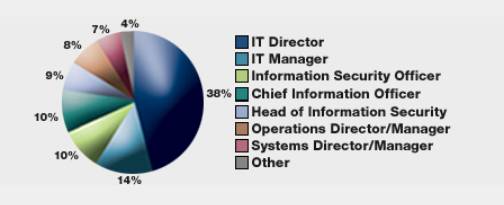 |
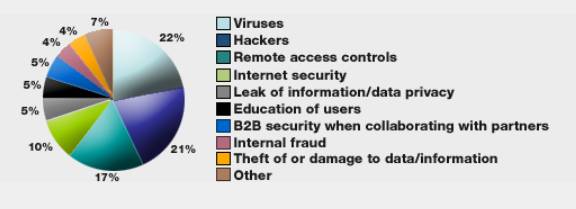 |
The
critical security issues for South Africa were closely related to the rest of
the world. The two most critical security issues facing South African
organisations are viruses (20%) and remote access controls (20%) followed by
hackers (16%), theft or damage to data/information (8%) and education of users
(6%).
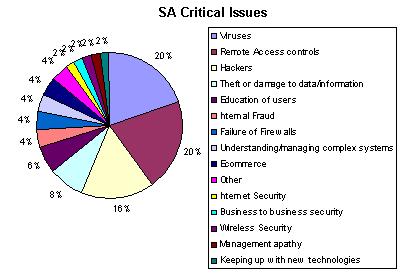
Almost
all organisations (96%) feel that they are taking reasonable steps to protect
themselves. In reality 87% of the organisations that participated in the survey
suffered some form of security breach this year.
The average direct loss of all breaches suffered by each organisation
participating is USD$108,000! Virus incidents in South African companies
resulted in an average loss of USD$54 000 per year and theft of equipment in an
average loss of USD$16 000 per year.
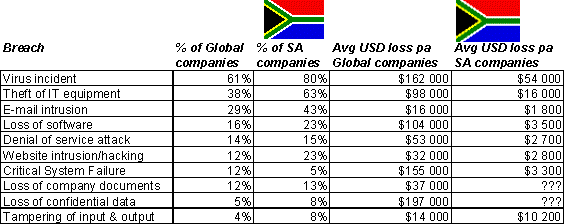 |
Companies
do not protect information as well as they think they do. One reason is that
they do not measure or report on security performance or how much is spent on
information security in the organisation. The survey indicated that 70% of South
African companies spend 1-10 % of the IT budget on security and 15% spend
11-20%. Research has shown that it is much more cost effective to invest in
security upfront, as a preventative measure, rather than to pick up the pieces
and repair the damage after a security incident.
Any
security project needs to have guidance to produce an elective security
capability in the organisation. BS7799/ ISO 17799 provides such guidance as it
provides an international standard for information security management. The
survey found that only 13% of the companies in South Africa have implemented ISO
17799 and 15% are planning to. Twenty percent of the companies in EMEA have
implemented ISO 17799, 18% in Asia and 15% in the Americas. It was found that
more financial sector (FS) organisations have implemented ISO 17799 (FS 25%,
others 16%) compared to the other sectors. They also have more intrusion
detection systems (FS 25%, other 16%) and also measure the performance on
security more (FS 42%, other 33%). As a result, Financial Sectors have a lower level of security
incidents in almost all areas than other sectors.
A
lot of South African organisations are making use of outsourcing for their
security. Thirty five percent outsource firewall administration, security design
and development. Globally 33% of the organisations outsource firewall
administration and 23% outsource security design and development.
Most
organisations world wide (51%) and in South Africa (43%) have not yet thought
about implementing PKI. In South Africa only 8% have a fully implemented a PKI
solution and globally 10%. The focus seems to have remained on passwords as
providing adequate security. This is one area where South Africa seems to be
ahead of the rest of the world with 59% of the organisations forcing monthly
password changes in contrast with the global figure of 44%.
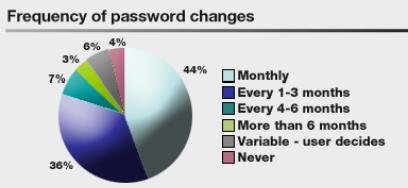 |
In
summery: Look for the weakest link. A company’s security is only as
strong at its weakest link. Millions of dollars are lost each year when
companies are not as well protected as they think. There are significant
regional and market sector variances in security protection levels because few
organisations measure and report on security incidents often resulting in
immensurable losses to the organisation.
KPMG
assists their clients in addressing their weakest link. We recommend an
enterprise wide architectural approach to security addressing security
leadership, the security program, security policies, security management, user
management, information asset security and technology protection and continuity.
Additionally we also have a range of information security and risk management
services to help organisations protect themselves against security issues and
breaches.
In
order to implement an affective security capability, organisations need to
identify their weakest link and understand how pervasive security really is in
the market place.
Contact KPMG for a copy of the survey or download the Executive Summary Global IS Survey 2002 (Pdf) here.